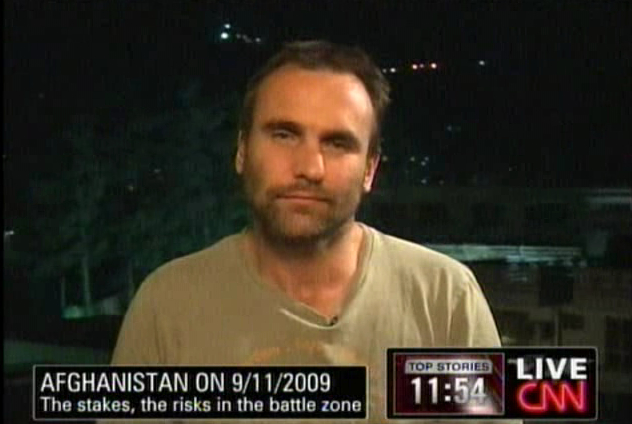NR: "Al Qaeda does not have bases or sanctuary of any kind here in Afghanistan."
September 11, 2009

Length: 3:34
LARGE (41.2 MB) ----- SMALL (4.4 MB)
Michael talks to Kyra Phillips about Osama bin Laden's relevancy to the current war in Afghanistan.
KYRA PHILLIPS: Would you have thought back on 9/11/2001 that eight years later the stakes in Afghanistan would be as high as ever?
CNN's Michael Ware can tell us more about that. He's been in the battle zone with some extraordinary reports. He joins us live once again from Kabul.
And I don't know about you, Michael, but I find it fascinating that even eight years later, still so many people don't understand the difference between al Qaeda and the Taliban, and how it all came together on 9/11, and how much of that terrorism still thrives in that country.
MICHAEL WARE, CNN CORRESPONDENT: Well, that's right. I mean, it was a complex mix of extremist, you know, jihad or holy war and Islamic militant groups that were festering here in Afghanistan that, you're right, did give rise to the actual September 11 attacks.
However, that was eight years ago. That was a long time ago. Al Qaeda does not have bases or sanctuary of any kind here in Afghanistan. Al Qaeda attacks account for just mere percentage points out of the bulk of the violence that's occurring here at the hands of the Afghan Taliban.
Indeed, the U.S. military mission here is fighting a war that no longer really has much to do with Osama bin Laden or al Qaeda. They're across the border in Pakistan's wild tribal areas.
Here in Afghanistan, this is a fight with the Afghan Taliban, a very different organization to al Qaeda. Extremist Islamic group, but one that cares only about Afghanistan. The threat to America, you know, many people argue -- is the countering that threat to America's national security being answered by fighting the war in Iraq today? People here on the ground legitimately asking that, Kyra.
PHILLIPS: And how important do you think it is eight years later that the U.S. military has not found or captured Osama bin Laden?
WARE: Well, I mean, obviously, Osama bin Laden is an extraordinary symbol for both sides of this conflict. The fact he's still alive, the fact that he can still be out there is an enormous symbolic achievement, a victory for al Qaeda and its supporters. And obviously, it's a bitter pill for the West to take, knowing that he's still lurking out there somewhere.
However, operationally, effectively, here on the ground, or in terms of al Qaeda's, you know, international operations, it kind of doesn't matter. Even if you capture Osama bin Laden tonight, once the celebrations have died down, you'll find that there's an al Qaeda that still continues without him, perhaps in some ways even stronger.
I mean, al Qaeda is an organization designed for loss. It's a network that's built knowing it's going to lose its leadership and its members, so those below are immediately ready to step up. It's compartmentalized, fractured and broken up and sprinkled across the world. So if they do lose their leader Osama bin Laden, that doesn't necessarily mean anything to the actual body of the al Qaeda terror machine itself, Kyra.
PHILLIPS: Michael Ware, great work this week. Thanks so much.
